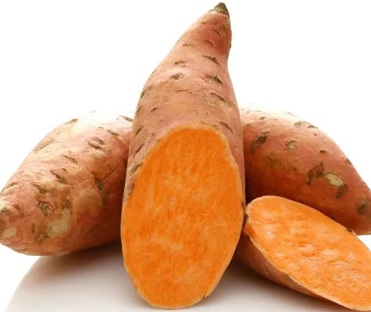Nikhil Prasad Fact checked by:Thailand Medical News Team Jun 01, 2024 10 months, 3 weeks, 4 days, 14 hours, 44 minutes ago
COVID-19 News: In a groundbreaking study, researchers from Chia Nan University of Pharmacy and Science, Asia University, and China Medical University in Taiwan have discovered that a naturally occurring protein in sweet potatoes may help combat COVID-19. The protein, known as Sweet Potato Trypsin Inhibitor (SWTI), appears to downregulate two key proteins involved in the virus's entry into human cells: ACE2 and TMPRSS2. This discovery covered in this
COVID-19 News report, opens up exciting possibilities for new, plant-based treatments to prevent and manage COVID-19.
 Protein From Sweet Potato Can be Used To Treat COVID-19
The Global COVID-19 Crisis
Protein From Sweet Potato Can be Used To Treat COVID-19
The Global COVID-19 Crisis
The COVID-19 pandemic has wreaked havoc worldwide, causing millions of deaths and disrupting economies on a massive scale. As scientists race to develop effective treatments and vaccines, understanding the mechanisms of how the virus infects cells is crucial. The virus primarily uses the ACE2 receptor to enter human cells, facilitated by the TMPRSS2 protein, which helps activate the virus’s spike protein. This understanding has led researchers to explore various ways to inhibit these proteins to prevent infection.
Sweet Potato’s Hidden Power
Sweet potatoes are more than just a nutritious food; they contain powerful proteins that protect the plant from pests and pathogens. One such protein is SWTI, which makes up about 60% of the total water-soluble proteins in sweet potato roots. SWTI is known for its health benefits, including antioxidant, anti-inflammatory, ACE-inhibitory, and anticancer properties. The Taiwanese research team discovered that SWTI significantly reduces the expression of ACE2 and TMPRSS2 proteins without causing adverse effects on cells, suggesting a potential role in inhibiting SARS-CoV-2 infection.
The Study: Methodology and Findings
-Separation and Purification of SWTI
The researchers used aqueous two-phase systems to purify SWTI from sweet potatoes. They identified two protein bands at 50 kDa and 23 kDa, with the 23 kDa band being the major trypsin inhibitor. This band was further isolated for use in experiments, demonstrating strong inhibitory activity against trypsin in vitro.
-Cell Toxicity and Protein Expression Reduction
Using HepG2 (liver cancer) and 293T (human embryonic kidney) cells, the team tested SWTI’s impact on ACE2 and TMPRSS2 expression. They found that SWTI concentrations below 1000 μg/mL were non-toxic, allowing them to use 500 and 1000 μg/mL in further tests. After 24 hours of exposure to SWTI, the cells showed a dose-dependent reduction in ACE2 and TMPRSS2 protein expression.
-In Vivo Efficacy
To evaluate SWTI’s effectiveness in living organisms, the researchers conducted an animal study. Mice were given oral doses of 0.5 and 1.0 g/kg of SWTI for 14 days. The results showed no significant changes in body weight or toxicity in the liver, kidneys, o
r lungs, indicating the safety of SWTI.
-Immunohistochemical and Western Blot Analysis
Further analysis revealed that SWTI treatment effectively inhibited ACE2 and TMPRSS2 protein expression in liver, kidney, and lung tissues. Immunohistochemical images and Western blot analysis confirmed these findings, suggesting that SWTI could be a viable candidate for preventing SARS-CoV-2 infection.
Implications for COVID-19 Treatment
With the global spread of COVID-19, finding effective treatments, especially for high-risk groups, is imperative. Targeting viral entry through adjuvant therapy could significantly reduce disease severity and limit viral propagation. SWTI’s ability to downregulate ACE2 and TMPRSS2 offers a promising new avenue for treatment.
ACE2 and TMPRSS2: Key Players in Viral Entry
ACE2 is widely expressed in various organs, including the lungs, heart, kidneys, and intestines. It acts as a receptor for SARS-CoV-2, facilitating viral entry into cells. TMPRSS2, on the other hand, enhances the virus’s ability to fuse with host cell membranes. By inhibiting these proteins, SWTI can potentially block the virus’s entry into human cells, offering a new strategy to combat COVID-19.
Broader Implications and Future Research
This discovery highlights the importance of exploring natural compounds in the fight against COVID-19. SWTI’s multiple health benefits and its ability to inhibit key proteins involved in viral entry make it a promising candidate for further research. Future studies could explore the potential of SWTI in combination with other treatments and its effectiveness against different SARS-CoV-2 variants.
Conclusion
The discovery of SWTI’s antiviral properties represents a significant step forward in the fight against COVID-19. As researchers continue to explore its potential, this natural compound could play a crucial role in developing new treatments to prevent and manage COVID-19. The humble sweet potato, a staple in many diets, may soon be recognized for its powerful contributions to global health.
The study findings were published in the peer reviewed International Journal of Molecular Sciences.
https://www.mdpi.com/1422-0067/25/11/6067
For the latest
COVID-19 News, keep on logging to Thailand Medical news.
Read Also:
https://www.thailandmedical.news/news/study-finds-that-sars-cov-2-in-the-nasal-or-oral-cavity-is-activated-by-the-action-of-trypsin-like-proteases-and-the-presence-of-anaerobic-bacteria
https://www.thailandmedical.news/news/korean-researchers-discover-that-the-enzyme-trypsin-facilitates-sars-cov-2-entry-at-the-cell-surface
